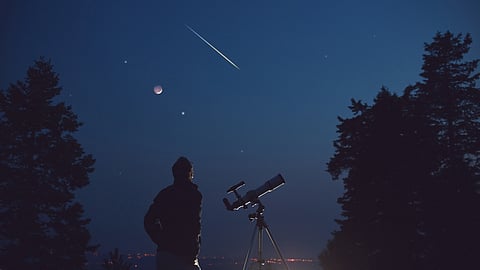

September is a month of celestial wonder, as the skies come alive with many spectacular events that captivate both seasoned astronomers and casual stargazers. With the transition from summer to autumn in the Northern Hemisphere, the night sky offers a variety of astronomical phenomena that are visually appealing and steeped in cultural and scientific significance. Whether you're an experienced stargazer or someone who loves to marvel at the night sky, here are the top five celestial events you shouldn’t miss this September.
Neptune, the distant blue giant, will be in opposition on September 19. Opposition occurs when a planet is directly opposite the Sun in the sky as viewed from Earth, meaning Neptune will be at its closest approach to our planet and fully illuminated by the Sun. This is the best time to observe Neptune, though it won’t be visible to the naked eye. With a good telescope, you can see its bluish hue resulting from methane in its atmosphere. This is an excellent opportunity for astronomy enthusiasts to spot the eighth planet from the Sun, more than 4 billion kilometres away. The gas giant will be positioned in the constellation Pisces, making it easier to locate with the right equipment.
The Autumn Equinox on September 23 marks the official start of fall in the Northern Hemisphere and spring in the Southern Hemisphere. On this day, the Sun crosses the celestial equator, and day and night are approximately equal in length. The equinox is more than just a day of astronomical significance; various cultures worldwide have celebrated it for centuries. The balance of light and darkness is a time for reflection and often marks harvest festivals. In Japan, the Autumnal Equinox Day, or “Shūbun no Hi,” is a public holiday where people visit family graves to honour ancestors. This celestial event is a perfect moment to appreciate the changing seasons and the cycles of nature.
The Full Harvest Moon is perhaps the most iconic of September’s celestial events. Falling on September 29, this full moon is the closest to the autumn equinox and is known for its bright orange hue and extended time on the horizon. Historically, the Harvest Moon provided farmers extra light to work into the evening during the harvest season, hence its name. The moon’s low angle relative to the horizon creates a mesmerising effect, making it appear larger and more colourful than usual. It’s a magical sight that can be enjoyed with the naked eye, whether you’re in a rural area or a bustling city.
September 21 is a day dedicated to celebrating our closest celestial neighbour. International Observe the Moon Night is a global event that encourages people to look up and learn about the Moon. Astronomy clubs, observatories, and planetariums worldwide host events, offering telescope views and educational programs. Whether you’re a seasoned astronomer or a curious onlooker, this event provides a great opportunity to learn about the Moon’s phases, surface features, and role in human history and culture.
Venus, often called the “Morning Star,” will shine brightly in the eastern sky before dawn throughout September. This inner planet, often the third-brightest object in the sky after the Sun and the Moon, will be particularly prominent during the early morning hours. Venus’s brilliance is due to its thick, reflective cloud cover, which makes it an easily recognisable celestial object even in light-polluted areas. For early risers, spotting Venus is a rewarding experience, offering a moment of serenity and awe before the day begins. The best time to see Venus will be just before sunrise.
